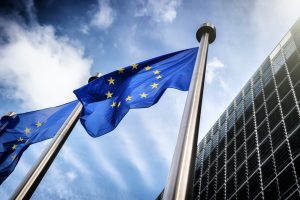In a much-anticipated State of the Union Address on September 15, European Commission President Ursula Von der Leyen announced the launch of the EU´s new connectivity strategy, the Global Gateway. Von der Leyen stressed the Global Gateway would ensure the EU will invest more strategically worldwide and “create links and not dependencies.” The Global Gateway was widely interpreted as a response to China’s Belt and Road Initiative (BRI), but was this new initiative really a response to China? There are two possible interpretations – one focused on China, and the other on the EU itself.
First, China has for many years now been criticized by the EU, the United States, and other developed nations for, inter alia, creating debt dependence through various infrastructure and investment schemes, particularly through the BRI. A brand new report spanning 165 countries purports to reveal billions of new “hidden” debts owed to China. The EU`s plan for the Global Gateway can be seen as a confirmation of the growing concern over China’s bold foreign economic policy initiatives and the BRI`s own inroads into Europe.
Launched in 2013, China’s Belt and Road Initiative (BRI) is a strategy that aims to connect Asia with Africa and Europe via sea and land with the goal of strengthening trade, policy coordination, infrastructure connectivity, economic growth, and regional integration. As of March 2020, 138 countries had signed a Memorandum of Understanding (MoU) with China on the BRI.
But there is an alternative interpretation for the Gateway. The fact is, despite its value-based agenda of democracy, social security, and human rights, the EU has many ongoing dependencies. Many countries, particularly African countries but also in Asia, have a highly dependent economic relationship with the EU. In 2019, 35 African countries had a trade deficit with the EU, with over 65 percent of exports from African countries to the EU constituting raw materials. In return, over 70 percent of imports from the EU to African economies were manufactured products. This skewed relationship persists despite decades of independence from European colonialism. The imbalances go beyond economics. Only recently has Germany, for example, agreed to pay reparations for colonial-era genocide in Namibia. Just this month, France apologized to Algerian soldiers massacred and ostracized after independence. The announcement of the Global Gateway can be viewed as a step toward the EU breaking long-standing dependency cycles and shifting toward mutually beneficial relationships and true partnership.
So which is the correct interpretation? Is the Gateway a response to China, or an internal problem to be rectified? It’s likely to be a mix of both. To understand why, it is worth taking a deeper dive into how the EU’s economic relationship with Africa has changed over time, as an example.
Currently, the EU as a region is Africa’s top trading partner for overall trade volumes, as well as imports and exports individually. In 2018, the total volume of trade in goods between Africa and the 27 EU member states was approximately 235 billion euros, accounting for more than 30 percent of trade on the continent. Compared with 125 billion euros in trade between China and Africa, it is clear that the EU has a strong economic foothold on the continent. Trends in Foreign Direct Investment (FDI) from the EU to Africa confirm this dominance. In 2018, FDI from Europe accounted for close to 50 percent of total stocks in Africa, versus China at just over 10 percent.
However, a more detailed comparison from 2000 to 2019 reveals interesting trends in the EU’s relationship with Africa.
Take trade. In 2000, 38 African countries had Europe as their top export market, and 30 countries had Europe as their main source of imported products. Fast forward to 2019, and 17 countries had Europe as their top export market and 10 countries had Europe as their principal source of imported products. This glaring difference is telling of the declining economic relationship between the EU and the majority of African countries. Although the EU maintains its position as the top trading partner for the continent as a whole, the individual trade relationships with the EU have fallen back. Overall trade volumes have effectively stagnated. While trade volumes with the EU have doubled since 2000, they have not kept up with African economic growth – which has quadrupled over the same period. Similar trends emerge when it comes to FDI from the EU to Africa.
This is where the comparison with China really does matter. Over the same period, despite the EU’s significant influence in many African countries – including use of European legal systems, use of European official languages and billions of euros in aid – China’s trade with Africa has multiplied by 20 times and its FDI into Africa has grown 100-fold. This doesn’t just signify that China has managed to penetrate the African economy at a rate that puts pressure on the EU. It means huge economic opportunities that Europe has somehow lost.
The data and analysis above shed critical light on why a singular focus on China as the reason for the EU’s launch of the Global Gateway is disproportionate and limiting. The fact is, there is good reason – even without China’s existence – to seek to upgrade Europe’s relationships with developing countries, including African and Asian countries. The data clearly points to a stagnating economic relationship between the EU and many African countries. If the EU wants to continue to be relevant to the rest of the world, it needs to be able to strengthen and coordinate its global trade and investment interests in a much more determined, intentional way. This is enough of a reason to launch an initiative such as the Global Gateway. The biggest task now will be to see it through.

































